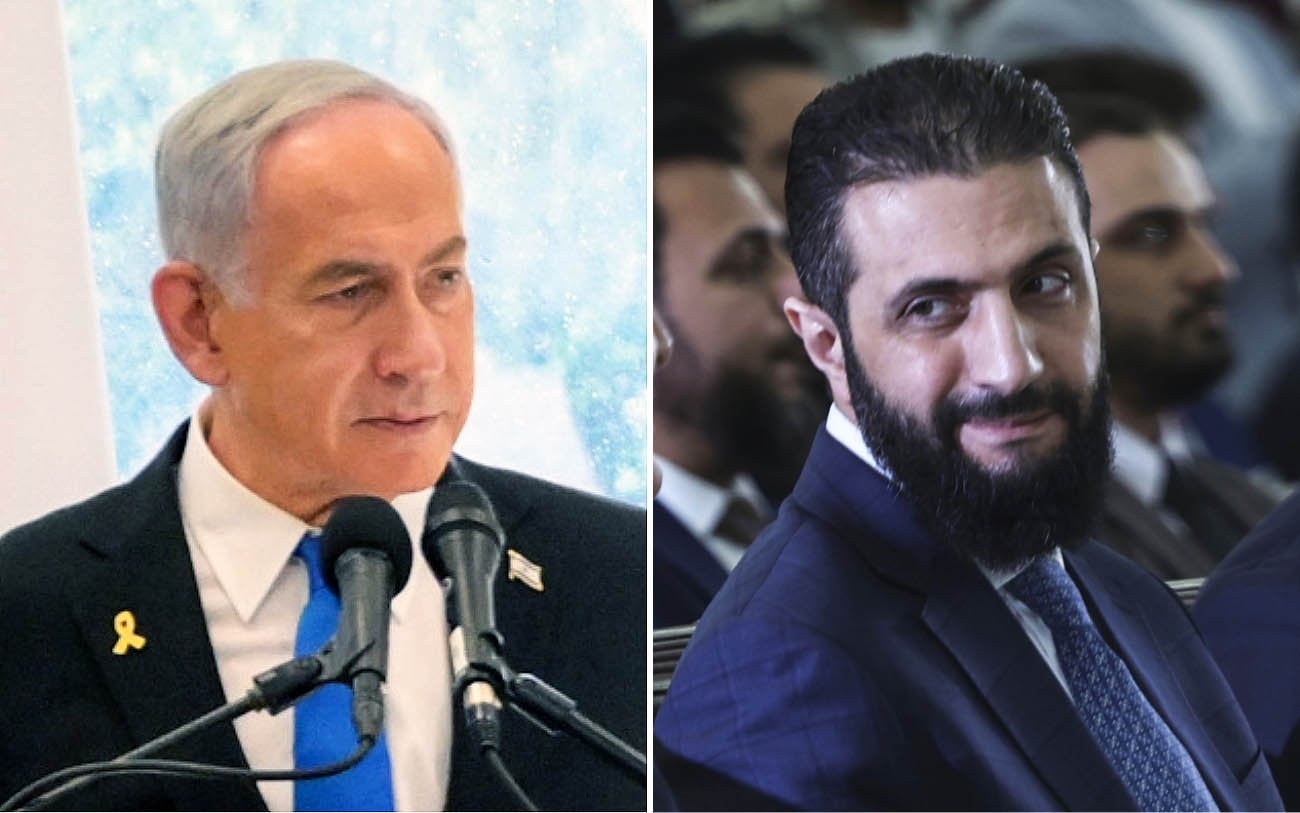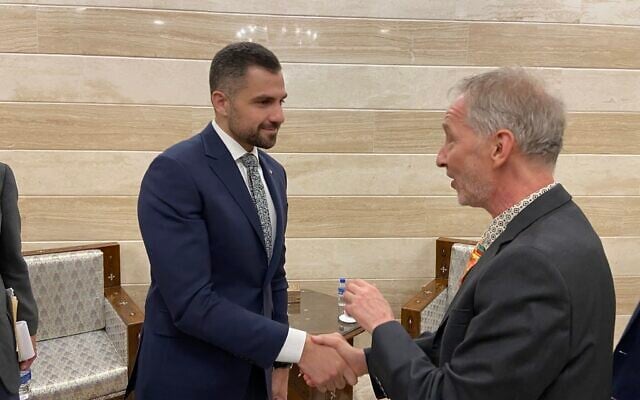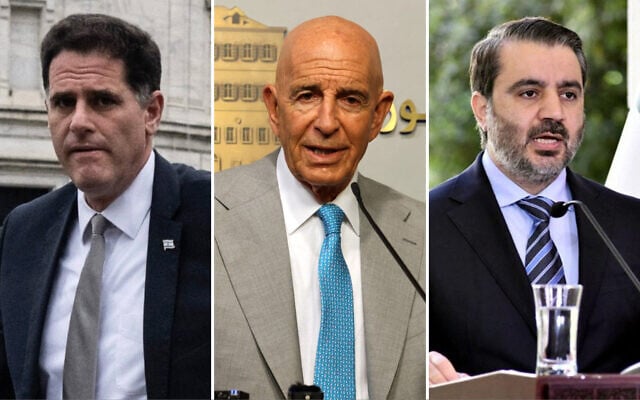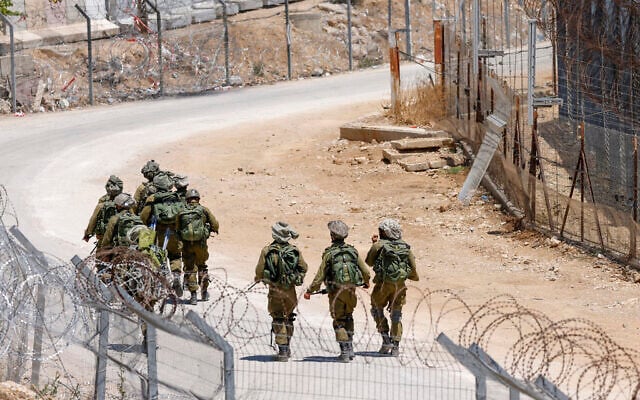


Prime Minister Benjamin Netanyahu is set to convene a meeting Sunday evening to discuss an emerging security agreement with Syria, the office of one of the attendees told The Times of Israel on Saturday, as the United States was reported to be pressuring Israel to compromise on some of its demands.
The meeting was set to take place at Netanyahu’s Jerusalem office.
There has been anticipation that a new security agreement will be announced this coming week on the sidelines of the UN General Assembly in New York, which both Netanyahu and Syrian President Ahmed Al-Sharaa will be attending.
Sharaa himself said on Wednesday that the ongoing negotiations could lead to results “in the coming days,” and a Syrian foreign ministry official told AFP on Thursday that several security and military agreements were expected to be signed by the end of the year.
Syria and Israel are in talks to reach an agreement that Damascus hopes will secure a halt to Israeli airstrikes and the withdrawal of Israeli troops who have pushed into southern Syria, with the sides holding a US-brokered meeting in London on Wednesday that the Axios news site said lasted five hours.
According to the report, Syrian Foreign Minister Asaad al-Shaibani presented Strategic Affairs Minister Ron Dermer with Syria’s response to an Israeli proposal for the security arrangement.
On Saturday, Kan news reported that Washington was pressuring Israel to narrow the gaps between its positions and those presented by Damascus in the talks in order to be able to present a breakthrough this week at the General Assembly.
The report cited unnamed Israeli sources who said that while the talks have seen progress, an agreement still “isn’t ripe.”
Channel 12 news cited an unnamed senior Israeli source as claiming that the progress in the talks came due to Syria compromising on some of its stances, adding that in Sunday’s meeting, Dermer was to update Netanyahu and ministers about the status of the talks and the compromises needed to seal a deal.
Another senior Israeli official was quoted by the network as saying Israel won’t withdraw from the Syrian side of Mount Hermon, and adding: “We don’t really believe this regime, but a deal could prevent escalation and stabilize the situation on the border.”
Meanwhile, an unnamed Syrian source close to the new government was cited by Kan as saying that from Damascus’s perspective, the deal is “pretty much ready” and it could realistically be signed this coming week.
Sharaa’s administration this week allowed The Times of Israel’s chief editor David Horovitz to visit Damascus as part of a Jewish delegation.
Read more: 48 surreal hours in Damascus — an Israeli reporter’s travelogue from an enemy capital
Sharaa is expected to meet US President Donald Trump in New York this coming week and to speak at the UN General Assembly on Wednesday, the first time a Syrian president attends the annual meeting since 1967.
Speaking to reporters on Wednesday, Sharaa said the security pact with Israel was a “necessity” and that it would need to respect Syria’s airspace and territorial unity and be monitored by the United Nations.
Sharaa denied reports that the US was putting pressure on Syria to wrap up the talks quickly, and said instead that it was playing a mediating role.
He said Israel had carried out more than 1,000 strikes on Syria and conducted more than 400 ground incursions since December 8, when the rebel offensive he led toppled former Syrian leader Bashar al-Assad.
Sharaa said Israel’s actions were contradicting the stated American policy of a stable and unified Syria, which he said was “very dangerous.”
He said Damascus was seeking a deal similar to a 1974 disengagement agreement between Israel and Syria that created a demilitarized zone between the two countries following the 1973 Yom Kippur War a year earlier.
He said Syria sought the withdrawal of Israeli troops but that Israel wanted to remain at strategic locations it seized after December 8, including the Syrian side of Mount Hermon. Israeli ministers have publicly said Israel intends to keep control of the sites.
Sharaa said if the security pact succeeds, other agreements could be reached. He did not provide details, but said a peace agreement or normalization deal like the US-mediated Abraham Accords, under which several Muslim-majority countries agreed to normalize diplomatic ties with Israel, was not currently on the table.
He also said it was too early to discuss the fate of the Golan Heights, much of which Israel captured from Syria in the 1967 Six Day War and later extended sovereignty over the territory.
Sharaa also said Syria and Israel had been just “four to five days” away from reaching the basis of a security pact in July, but that developments in the southern province of Sweida had derailed those discussions.
Syrian troops were deployed to Sweida in July to quell fighting between Druze armed factions and Bedouin fighters. But the violence worsened, with Syrian forces accused of execution-style killings and Israel striking southern Syria, the defense ministry in Damascus and near the presidential palace.
Israel, which has its own Druze community, carried out airstrikes on government targets, saying it was acting to defend the minority group as well as to enforce its demands for the demilitarization of southern Syria.
Syrian authorities have said their forces intervened after the violence broke out to stop the clashes, but witnesses, Druze factions and the Syrian Observatory for Human Rights watchdog have accused them of siding with the Bedouin and committing abuses against the Druze.
Agencies contributed to this report.





